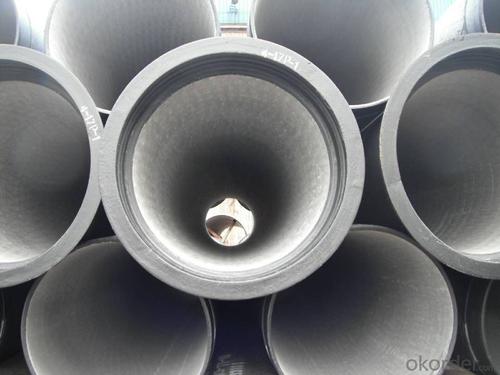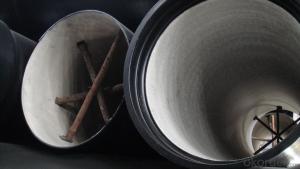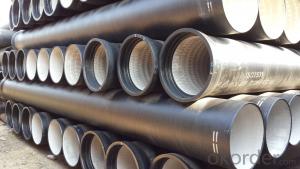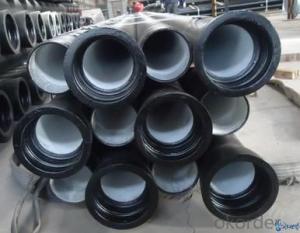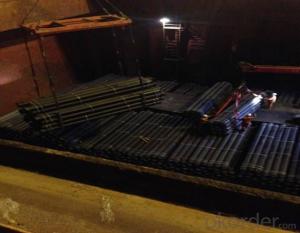DUCTILE IRON PIPE DN500
- Loading Port:
- China Main Port
- Payment Terms:
- TT OR LC
- Min Order Qty:
- -
- Supply Capability:
- -
OKorder Service Pledge
OKorder Financial Service
You Might Also Like
Specification:
1) The standard of pipe: ISO2531:1998, K9
2) Effective length: 6m
3) Inner cement line: Portland cement line as per ISO4179
4) Zinc coating: at least 130g/m2 as per ISO8179
5) Bitumen painting: at least 70um as per ISO8179
6) With 100% quantity of NBR ring, or SBR ring, or EPDM ring as per ISO4633
7) DN80mm-800mm
8) High strength, lighter than grey iron, good corrosion resistance, no furring, small flow resistance, easy fixing, long life tome about 100 yeas
9) Produced by Hangzhou chunfeng machine
10) Checked by automatic inspection equipment
11) Composition:
Chemical composition | |||
Chemical composition | Ductile Cast Iron Pipe (%) | Grey iron pipe (%) | Steel pipe (%) |
C | 3.5-4.0 | 3.2-3.8 | 0.1-0.2 |
Si | 1.9-2.6 | 1.4-2.2 | 0.15-0.4 |
Mn | 0.15-0.45 | 0.4-0.6 | 0.3-0.6 |
P | ≤0.06 | ≤0.3 | 0.02-0.03 |
S | ≤0.02 | ≤0.1 | 0.02-0.03 |
Mg | 0.03-0.06 |
|
|
12) Feature:
Mechanical properties | |||
| Ductile Cast Iron Pipe | Grey Iron Pipe | Steel Pipe |
Tensile Strength(Mpa) | ≥420 | 150-260 | ≥400 |
Yield Strength(Mpa) | ≥300 | No Confirmation | No Confirmation |
Bending Strength(Mpa) | ≥590 | 200-360 | ≥400 |
Elongation (%) | ≥10 | Neglected | ≥18 |
Brinell Hardness(HBS) | ≤230 | ≤230 | About 140 |
13) T type mechanical joint
14) Packing: in bulk or container
- Q: Are ductile iron pipes suitable for horizontal auger boring installations?
- Yes, ductile iron pipes are suitable for horizontal auger boring installations. Ductile iron pipes have excellent strength and durability, making them ideal for underground installations. They can withstand the lateral forces and vibrations involved in auger boring, ensuring a reliable and long-lasting pipeline system.
- Q: Can ductile iron pipes be used in areas with high soil acidity?
- To ensure the durability and performance of ductile iron pipes in areas with high soil acidity, certain precautions should be taken. Ductile iron pipes are renowned for their strength, durability, and resistance to corrosion, making them suitable for various soil conditions, including those with high acidity. However, the presence of high soil acidity can still pose a potential risk to ductile iron pipes over time. Acidic soils can accelerate the corrosion process, leading to the degradation of the pipe material. To mitigate this risk, the following measures can be implemented: 1. Protective Coatings: Applying protective coatings, such as epoxy or polyethylene, to the outer surface of the pipes adds an extra layer of defense against soil acidity. These coatings act as a barrier, preventing direct contact between the pipe and the corrosive soil. 2. pH Adjustment: Adjusting the pH levels of the soil can help reduce its acidity. This can be achieved by incorporating lime or other neutralizing agents into the soil, creating a more favorable environment for the ductile iron pipes. 3. Cathodic Protection: Employing cathodic protection systems is an effective method to prevent corrosion in ductile iron pipes. This technique involves utilizing sacrificial anodes or impressed current systems to generate a protective electrical current that counteracts the corrosive effects of the soil. 4. Regular Inspections: Conducting periodic inspections is crucial to monitor the condition of the ductile iron pipes in high soil acidity areas. This enables early detection of any corrosion or degradation, facilitating timely repairs or replacements. By implementing these measures, ductile iron pipes can be effectively utilized in areas with high soil acidity, guaranteeing long-term performance and minimizing the risks associated with corrosive soils. However, it is advisable to consult experts or engineers familiar with local soil conditions and project requirements to determine the most suitable materials and protective measures.
- Q: Can ductile iron pipes be used for irrigation systems?
- Yes, ductile iron pipes can be used for irrigation systems. Ductile iron pipes are commonly used in various applications, including water supply systems and irrigation systems. They are known for their strength, durability, and corrosion resistance, making them suitable for transporting water in irrigation systems.
- Q: What are the different types of joints used with ductile iron pipe?
- The different types of joints commonly used with ductile iron pipe include push-on joints, mechanical joints, restrained joints, flanged joints, and welded joints. Each type of joint offers different benefits and is used depending on the specific requirements of the installation.
- Q: Are ductile iron pipes suitable for use in mining tailings pipelines?
- Mining tailings pipelines can utilize ductile iron pipes due to their suitability for this purpose. These pipes possess remarkable strength and durability, enabling them to endure the harsh and abrasive conditions often encountered in mining operations. With their high tensile strength, they can effectively handle the pressure and weight of the tailings material. Furthermore, their resistance to corrosion is crucial in mining environments where the tailings may contain corrosive chemicals or substances. Moreover, ductile iron pipes are known for their ease of installation and maintenance, providing a valuable advantage in time-sensitive mining operations. Ultimately, ductile iron pipes offer a dependable and cost-effective solution for mining tailings pipelines.
- Q: Are ductile iron pipes more resistant to breaks and cracks than other pipe materials?
- Ductile iron pipes generally possess higher resistance to breaks and cracks compared to other pipe materials. Ductile iron, a form of cast iron treated with magnesium, exhibits increased flexibility and reduced brittleness. This enhanced flexibility empowers ductile iron pipes to endure significant pressure and external loads without incurring damage. In contrast to widely-used pipe materials such as PVC, HDPE, or steel, ductile iron pipes excel in strength and durability. They boast higher tensile strength, enabling them to withstand greater forces and pressures without succumbing to failure. Additionally, ductile iron pipes demonstrate superior impact resistance, reducing the likelihood of cracking or breaking when subjected to sudden impacts or external loads. Another advantage of ductile iron pipes lies in their ability to resist corrosion. The material naturally repels rust and remains unaffected by harsh environmental conditions, making it ideal for underground installations or areas with corrosive soils. This corrosion resistance further contributes to the pipes' longevity and overall integrity. Furthermore, ductile iron pipes possess a longer lifespan compared to other pipe materials. They are designed to endure for multiple decades, often exceeding 50 years, with minimal maintenance. This prolonged lifespan decreases the necessity for frequent replacements, resulting in time and cost savings in the long term. However, it is crucial to acknowledge that no material is entirely immune to damage or failure. Proper installation, maintenance, and adherence to industry standards and guidelines are imperative to ensure optimal performance and longevity of ductile iron pipes. Regular inspection and monitoring should also be carried out to identify potential issues or signs of deterioration, facilitating timely repairs or replacements.
- Q: Are ductile iron pipes suitable for bridge piers or abutments?
- Yes, ductile iron pipes are suitable for bridge piers or abutments. Ductile iron is known for its high strength and durability, making it a reliable choice for supporting heavy loads in bridge construction. Additionally, ductile iron pipes are corrosion-resistant, which is crucial for structures exposed to moisture and environmental factors.
- Q: Can ductile iron pipes be used for wastewater reuse projects?
- Yes, ductile iron pipes can be used for wastewater reuse projects. Ductile iron pipes have several properties that make them suitable for such projects. Firstly, they have high strength and durability, which allows them to withstand the pressure and load requirements of wastewater systems. Additionally, ductile iron pipes have excellent corrosion resistance, which is important in wastewater applications where the presence of chemicals and corrosive substances is common. Furthermore, ductile iron pipes have a smooth internal lining, which reduces friction and improves the flow of wastewater. This is crucial for efficient transportation and distribution of wastewater in reuse projects. Moreover, ductile iron pipes are also known for their ease of installation and maintenance. They can be easily connected using various joint options, allowing for quick and efficient installation. Additionally, ductile iron pipes have a long service life, reducing the need for frequent replacements and minimizing maintenance costs. Overall, the properties of ductile iron pipes make them a suitable choice for wastewater reuse projects, providing strength, durability, corrosion resistance, smooth flow, and ease of installation and maintenance.
- Q: How do ductile iron pipes perform in high-traffic areas?
- Ductile iron pipes perform exceptionally well in high-traffic areas due to their inherent strength and durability. These pipes are manufactured using a unique composition that includes graphite nodules, which give them their characteristic ductility. This ductility allows the pipes to flex and withstand heavy loads and vibrations caused by traffic without cracking or breaking. In high-traffic areas, where the ground is subject to constant movement and heavy loads from vehicles, ductile iron pipes offer superior resistance to stress and impact. Their ability to absorb and distribute the pressure from traffic ensures that these pipes maintain their structural integrity over time. This is particularly important as any damage or failure in a pipe system can result in costly repairs and disruptions to the water supply. Furthermore, ductile iron pipes are highly resistant to corrosion, making them suitable for installation in high-traffic areas exposed to various environmental conditions. The pipes are typically lined with a protective layer, such as cement mortar or epoxy, which provides an additional barrier against external factors. This corrosion resistance ensures the longevity of the pipes, reducing the need for frequent maintenance or replacement. Additionally, ductile iron pipes have excellent flow characteristics, allowing for efficient water distribution even in areas with high traffic demands. Their smooth interior surface minimizes friction and pressure losses, ensuring a consistent and reliable water supply to meet the needs of the surrounding population. Overall, ductile iron pipes are a reliable and robust choice for high-traffic areas. Their strength, durability, corrosion resistance, and efficient flow characteristics make them well-suited for withstanding the demands and challenges posed by heavy traffic, ensuring the continuous supply of water without compromising the structural integrity of the pipe system.
- Q: How are ductile iron pipes protected against external impact or loading?
- Ductile iron pipes are protected against external impact or loading through various methods. One common method is to apply a protective coating or wrapping on the pipes, which helps to prevent corrosion and reduces the risk of damage from external forces. Additionally, the pipes are often designed with a thicker wall thickness to enhance their strength and resistance to external impact. Furthermore, the installation of appropriate bedding and backfill materials around the pipes provides additional support and protection against external loading. Regular inspections and maintenance practices also play a crucial role in ensuring the long-term durability and protection of ductile iron pipes.
Send your message to us
DUCTILE IRON PIPE DN500
- Loading Port:
- China Main Port
- Payment Terms:
- TT OR LC
- Min Order Qty:
- -
- Supply Capability:
- -
OKorder Service Pledge
OKorder Financial Service
Similar products
Hot products
Hot Searches
Related keywords




